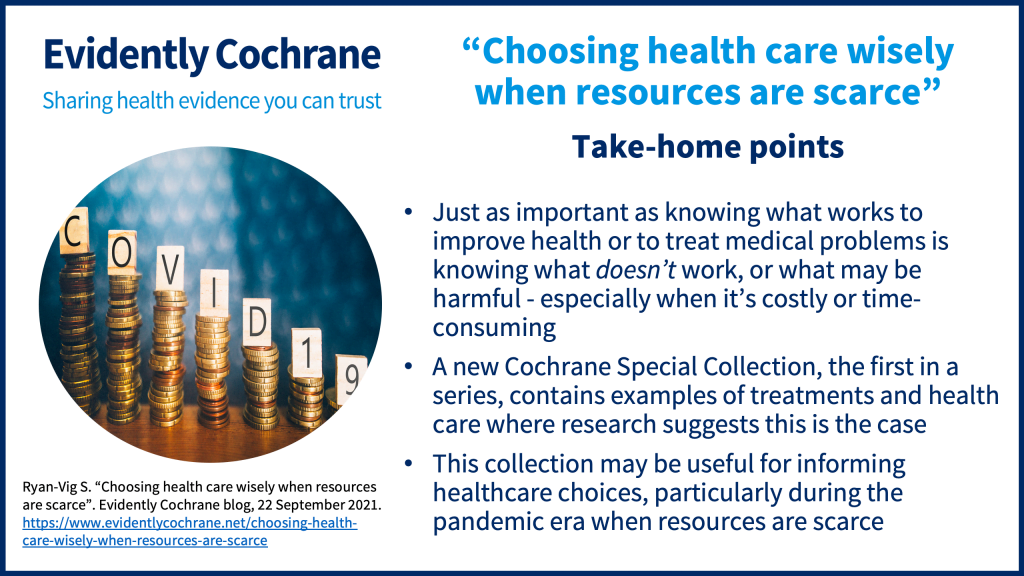In this blog, Selena Ryan-Vig (Knowledge Broker at Cochrane UK) describes the first in a new series of Cochrane Special Collections which brings together examples of treatments and health care which – despite being costly and time-consuming – research suggests could be unhelpful to patients, or even harmful.
Page last checked 11 July 2023
Take-home points

The COVID-19 pandemic has put huge pressure on health services. With so much attention and resource taken up by COVID-19, the health care available for people with problems not related to COVID-19 has declined in many countries (WHO, 2021). This will likely be the case for some time. Many people have had routine investigations and treatments postponed or cancelled and are facing delays in diagnosis and treatmentSomething done with the aim of improving health or relieving suffering. For example, medicines, surgery, psychological and physical therapies, diet and exercise changes..
When available resources are limited, the need to use them effectively and efficiently – in ways that give the most benefit for patients with the most need – becomes even greater. Making wise choices about health care is always important – but perhaps never more so than now.
Just as important as knowing what works to improve health or to treat medical problems is knowing what doesn’t work, or what may be harmful. This is especially the case for treatments or interventions which are particularly expensive or time-consuming for patients, the public, and health professionals. For example, those which require extra healthcare visits. This information could help people making decisions about health care see where time and money are best spent.
It’s important that any decisions like these are informed by the best available evidence.
‘De-implementation of low-value health care: Resource prioritization in the COVID-19 pandemic era’
For this reason, Cochrane Sustainable Health Care, which advocates and promotes the use of evidence to ensure a more sustainable approach to health care, has published the first in what will be a series of new Special Collections: ‘De-implementation of low-value health care: Resource prioritization in the COVID-19 pandemic era’.
This brings together examples of resource-intense interventions which research shows are unlikely to be helpful – or may even be harmful.
The findings of the reviews in this Special Collection call into question the benefit of a range of interventions, across a range of conditions. For example, whether people who have been treated for colorectal cancer actually benefit from more intense follow-up (more tests and doctor visits) after treatment or whether there’s any benefit of medically testing everyone before cataract surgery and several more.
You can read more detail about each of them in the Special Collection but, below, we explore three examples of interest to the general public making everyday health choices.
General health checks in adults
In many countries, healthy people are offered general health checks.
In the UK, anyone aged 40-75 who has not had a stroke, and does not have a pre-existing health condition, is invited to an NHS Health Check every 5 years.
The health checks aim to detect early signs of disease in the general populationThe group of people being studied. Populations may be defined by any characteristics e.g. where they live, age group, certain diseases.. The hope is that this will reduce disease and deaths, but it’s important to know what the evidence says, and what it says doesn’t support these health checks.
We can be confident that general health checks have little or no effect on the riskA way of expressing the chance of an event taking place, expressed as the number of events divided by the total number of observations or people. It can be stated as ‘the chance of falling were one in four’ (1/4 = 25%). This measure is good no matter the incidence of events i.e. common or infrequent. of:
- dying from any cause
- dying from cancer
- heart disease
We can also be moderately confident that health check-ups probably have little or no effect on the risk of:
- stroke
- dying from cardiovascular problems (conditions affecting the heart or blood vessels)
One idea why this might be the case is that GPs already do a good job of identifying and intervening when they suspect a person is at high risk of developing disease when they see them for other reasons. Another possible reason is that people at risk of developing disease may not attend general health checks when invited or may not follow suggested tests and treatments.
It’s also important to bear in mind that there are potential harms of screening healthy people. For example, identifying and treating risk factors that might never actually go on to cause illness or shorten life has costs – both personal and financial. People may undergo unnecessary further testing and treatment – which can itself be associated with harmful side effects – and they may also experience stress, worry, and inconvenience.
Read more:
- What are the effects of general health checks for reducing morbidity and mortality from disease in adults?
- Are general health checks beneficial?
- Screening: earlier detection of disease is not necessarily better
Dental care
Dental check-ups: how often is often enough?
In the UK, and many other countries, dentists recommend that people have a dental check-up every 6 months. Yet there is debate around how often we need check-ups. If we go less frequently, are we any worse off?
Here’s what the best available evidence says:
For adults, whether you have check-ups every 6 months, or at personalized intervals (i.e. the timing recommended by your dentist after assessing your risk of dental problems), has little or no effect on:
- tooth decay
- gum disease
- quality of life
Also, longer intervals between check-ups (up to 24 months for those at low risk of dental problems) may not lead to worse outcomesOutcomes are measures of health (for example quality of life, pain, blood sugar levels) that can be used to assess the effectiveness and safety of a treatment or other intervention (for example a drug, surgery, or exercise). In research, the outcomes considered most important are ‘primary outcomes’ and those considered less important are ‘secondary outcomes’..
Unfortunately, there is no reliable evidence available in children.
Patrick Fee, a researcher and dentist who led the review of the evidence, says:
“This research is valuable when considering the significant impact of the COVID-19 pandemic and its effect on dental services worldwide, limiting patient access to dental treatment.
Patient access to dental care may remain limited for some time, however, [these] results provide reassurance that intervals between check-ups can be extended beyond six months without detriment to oral health”.
Find out more in Patrick’s blog: ‘Dental check-ups: how often is often enough?’
Routine scale and polish
When we visit the dentist, we’re likely to be offered a ‘routine scale and polish’, where deposits such as plaque and tartar are removed from teeth. Even people at low risk of developing gum disease are likely to be offered this regularly.
However, it’s unclear whether scaling and polishing is helpful and cost-effective. The best interval between treatments is also unclear.
What can the best available evidence tell us?
For healthy adults who do not have severe gum disease and who regularly visit the dentist:
- regular scaling and polishing make little or no difference to the early signs of gum disease (such as bleeding gums) when measured up to three years later
- scale and polish may slightly reduce tartar, but it’s uncertain whether this is important
- patients may feel their teeth are cleaner, but scale and polish do not make a difference to patients’ quality of life
Considering the evidence behind healthcare options
The examples explored here mainly suggest a lack of benefit for patients. Importantly, some of the examples of interventions included in the Special Collection not only suggest a lack of benefit but also provide evidence of harm to patients. When making choices, it’s important to consider the evidence behind treatment options (ask your healthcare provider about both benefits and harms) and remember that:
- earlier detection of disease is not necessarily better
- more treatment is not necessarily better
- any treatment can have potential harms
With thanks to Dina Muscat Meng, Mike Clarke and Sarah Chapman for their comments and input.
The Special Collection described in this blog is the first in a series of special collections from Cochrane Sustainable Healthcare, highlighting ineffective or harmful interventions. They have plans to publish two more collections in this series. Each collection will be kept up to date, and any new or updated relevant reviews will be added.
Read the editorial accompanying this Special Collection: Making wise choices about low‐value health care in the COVID‐19 pandemic.
Find out more about Special Collections from Cochrane Sustainable Healthcare.
You may also like to listen to a new podcast series from Cochrane Sustainable Healthcare and the BMJ: The Recovery – Voices of action towards sustainable healthcare.
“The series features compelling and inspirational conversations with healthcare researchers, doctors, and activists from around the world who are actively working to wind back medical excess and forge more sustainable healthcare systems to improve our health, wellbeing, and climate.
Listeners can hear about new and sometimes radical initiatives that are changing the way doctors practice medicine, to ensure better access to high quality, evidence-based, and safe healthcare.”
Join in the conversation on Twitter with @CochraneUK and @Cochrane_SH or leave a comment on the blog.
Please note, we cannot give specific medical advice and do not publish comments that link to individual pages requesting donations or to commercial sites, or appear to endorse commercial products. We welcome diverse views and encourage discussion but we ask that comments are respectful and reserve the right to not publish any we consider offensive. Cochrane UK does not fact check – or endorse – readers’ comments, including any treatments mentioned.



Appreciate the advice on making informed health care choices. Feeling a bit anxious about selecting my own health care plan, but I’ll proceed carefully and take the time needed.
It’s crucial to make wise choices in healthcare when resources are limited. Prioritizing evidence-based practices, like those highlighted by Cochrane, ensures efficient allocation of resources for maximum impact. Let’s strive for equitable and effective healthcare delivery, even in challenging circumstances.
Thanks for the tip to make a wise choice about health care. I am nervous about getting my own health care plan. So I will take my time and be cautious.